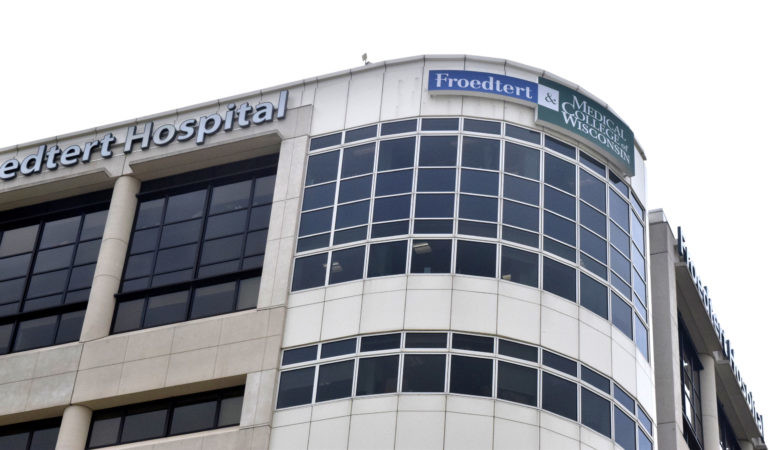Remote Monitoring of COVID-19 Patients Cuts Hospitalizations 32%
Promising study by Froedtert and Medical College of Wisconsin reported in AMA journal.

A study by Froedert and The Medical College of Wisconsin found that COVID-19 patients who used a remote symptom monitoring portal had a 32 percent lower rate of hospitalization than those who did not. Gretchen Brown/WPR
A study by Froedtert Hospital and the Medical College of Wisconsin found COVID-19 patients who used an online patient monitoring portal had a 32 percent lower rate of hospitalization than those who did not.
Between March and December 2020, 5,363 patients diagnosed with COVID-19 logged on to a remote patient monitoring program via their computers or a mobile phone app.
“About 1 in 6 people had some type of alert,” said Crotty. “Then our nurses would follow up with them so patients could integrate fairly easily into their day without having to schedule around it. But it enabled them to really stay in a constant type of connection with our clinical team.”
The study, published in The Journal of the American Medical Association Network Open, found those who used the portal had a 32 percent lower rate of hospitalization, on average, than other COVID-19 patients. Portal users that did require hospitalization were discharged from hospitals 2.7 days sooner, on average.
Crotty said researchers initially wondered whether the automated monitoring portal would help doctors find sicker patients more quickly.
“But really, we were surprised that patients who were engaged with the program and coached by the nursing team…were able to reduce their chances of being hospitalized,” said Crotty.
The technology was a force multiplier for the health system, Crotty said. He said three nurses were able to monitor between 2,500 and nearly 4,000 patients at one time.
Researchers were also surprised to see that older people were using the portal more than their younger counterparts. He said research over the last 20 years has shown a “digital divide” can lead to older users not engaging with online patient services.
Crotty said Froedtert and the Medical College of Wisconsin network will work to make the portal more user-friendly. He said part of the technical challenge also lies with slow or nonexistent high speed internet access in parts of Wisconsin.
“We still need to invest in having good internet signals for people to engage for their health care because this is where the internet and connectivity is a utility that’s really important for people’s health,” Crotty said.
Studies published by the Mayo Clinic Health System also found remote patient monitoring portals to treat COVID-19 patients was associated with a low mortality rate. For cancer patients who contracted COVID-19, Mayo found there was a 78 percent reduction in hospitalization risks.
Listen to the WPR report here.
COVID-19 patients using remote monitoring portal had 32 percent lower hospitalization rate, study shows was originally published by Wisconsin Public Radio.
More about the Coronavirus Pandemic
- Governors Tony Evers, JB Pritzker, Tim Walz, and Gretchen Whitmer Issue a Joint Statement Concerning Reports that Donald Trump Gave Russian Dictator Putin American COVID-19 Supplies - Gov. Tony Evers - Oct 11th, 2024
- MHD Release: Milwaukee Health Department Launches COVID-19 Wastewater Testing Dashboard - City of Milwaukee Health Department - Jan 23rd, 2024
- Milwaukee County Announces New Policies Related to COVID-19 Pandemic - County Executive David Crowley - May 9th, 2023
- DHS Details End of Emergency COVID-19 Response - Wisconsin Department of Health Services - Apr 26th, 2023
- Milwaukee Health Department Announces Upcoming Changes to COVID-19 Services - City of Milwaukee Health Department - Mar 17th, 2023
- Fitzgerald Applauds Passage of COVID-19 Origin Act - U.S. Rep. Scott Fitzgerald - Mar 10th, 2023
- DHS Expands Free COVID-19 Testing Program - Wisconsin Department of Health Services - Feb 10th, 2023
- MKE County: COVID-19 Hospitalizations Rising - Graham Kilmer - Jan 16th, 2023
- Not Enough Getting Bivalent Booster Shots, State Health Officials Warn - Gaby Vinick - Dec 26th, 2022
- Nearly All Wisconsinites Age 6 Months and Older Now Eligible for Updated COVID-19 Vaccine - Wisconsin Department of Health Services - Dec 15th, 2022
Read more about Coronavirus Pandemic here





















